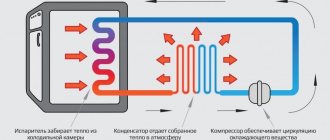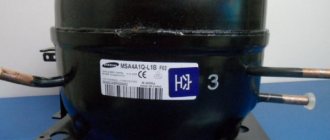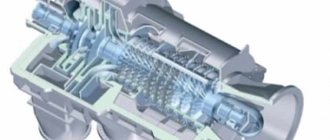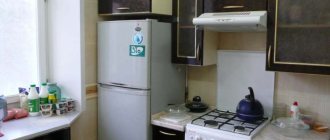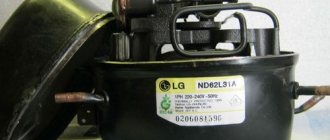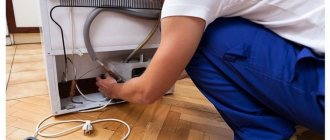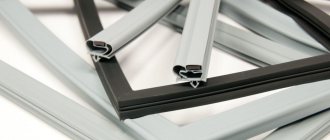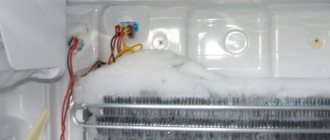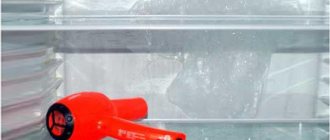Why is this happening?
If the refrigerator retains heat and not cold, the cause of this phenomenon must be sought based on the design of the unit. The Internet is full of photos and diagrams that fully illustrate the structure of the refrigeration chamber. Before sounding the alarm, check that the door is tightly closed. If the seal of the cabinet is broken, the cold begins to leave its limits, and the heat, on the contrary, begins to penetrate.
So, what other reasons for sudden warming in the refrigerator:
- Door. Check this in the refrigerator first, and then pay attention to the freezer. If the refrigerator is warm and the freezer is working as usual, then the problem most likely lies in the door. If a breakdown occurred in the cooling system, the unit would completely stop freezing.
- Fan. The refrigerator may be warm if the fan is frozen over. A common reason for this phenomenon is long-term operation without defrosting. The first sign of alarm may be the quiet operation of the appliance, as well as the fact that the freezer has ceased to perform its direct function. It is easy to fix such a breakdown; just defrost the refrigerator.
Defrosting the refrigerator
- High temperature difference. The refrigerator may turn into a warm place due to an error in setting the temperature. Surely in 40-degree heat you set the maximum cooling value. This situation threatens to damage the compressor.
Temperature regulation
These causes of a “warm refrigerator” are quite common, and the best part is that you can fix them yourself. To do this, you either need to press the door tightly or defrost the unit, then you will no longer have heat in the refrigerator.
Let's contact a specialist
If you have checked the entire device, eliminated obvious causes, but there is still heat in the refrigerator, then it’s time to call a technician.
A breakdown of the refrigeration chamber can occur due to a leak of freon, which is located along the circuit of the unit. The cause of the leak may be damage to that same circuit as a result of careless handling. A freon leak threatens to disrupt the entire cooling system. It is almost impossible to immediately suspect the cause of the breakdown. The refrigerator works as before, the motor is working, the lamp is on. The main sign of such a breakdown is that the unit does not freeze. The technician who comes will identify the damage and fill the cooling system with the necessary gas.
Refilling the refrigerator with freon
There are times when the engine is humming, the lamp is on, and the refrigerator is warm. The cause of this phenomenon may be a coating of rust on the circuit. This occurs due to increased condensation. The mechanism of damage is simple: water gets on the plastic, forming microcracks in it through which freon leaks. All this interferes with the proper operation of the cooling system. To normalize the temperature in the refrigerator, you need to call a specialist. He will replace the damaged part of the circuit and fill the unit with freon. Prevention of malfunction: constant monitoring of the device and timely removal of accumulated liquid. You can also extend the life of the device if you do not plug it in immediately after defrosting. First, let the refrigerator dry.
Why else does the refrigerator get warm? Lack of defrosting leads to the accumulation of thick pieces of ice and frost on the walls. All this disrupts the cooling system and leads to freon leakage. Such a breakdown cannot be repaired simply by calling a repairman. In such cases, the refrigerator is delivered to a service center, where the circuit is replaced and the systems are refilled with freon.
Refrigerator with ice
Advice from experts: treat your equipment with care, monitor its condition and the condition of its parts.
Why do the walls of the refrigerator heat up?
If the refrigerator is heating up on the sides, then the normal and obvious reason for the increase in temperature is the operation of the compressor. Therefore, when the motor is running, which can be determined by the characteristic noise, heating of the walls may be observed. The temperature rises for about twenty minutes while the engine is running, then drops and returns to normal.
For some models, the partition between the chambers or between the freezer and refrigerator heats up, which is associated with temperature differences in these zones, as well as the accumulation of energy emanating from the products placed in the appliance.
Abnormal heating can occur for various reasons:
- Exposure to an external heat source, for example, a nearby stove. Also, the walls can heat up when exposed to direct sunlight through a window during the day (the increase in body temperature is especially noticeable if the refrigerator is dark).
- The device may become warm when first turned on, since there is much more heat inside that needs to be removed outside through the condenser.
- Heating often occurs after the appliance has completely defrosted, since the temperature inside the chamber will be much higher than usual, maintained during operation of the refrigerator.
- If the refrigerator is located next to another appliance or piece of furniture, then heating of the walls may occur due to the small space around the body. Normally, it should be at least 5-7 centimeters, and this is enough for timely and complete heat removal. If there is not enough space, the walls will heat up.
- A heating radiator or heating device located nearby.
- Placing large amounts of unrefrigerated food in the refrigerator. Since the amount of heat inside increases, all parts of the device work in increased mode, which causes the housing to heat up. In addition, the capacitor needs to output more thermal energy, which also increases the temperature.
- The presence of a thick layer of ice in the freezer, which disrupts heat transfer.
- Enabling the fast freezing function, in which the device is configured to accelerate the cooling of the chambers. Accordingly, thermal energy is transported out faster, and the condenser heats up more.
- If the owner puts a hot product in the refrigerator, this will also lead to heating, because the device will urgently need to remove a large amount of heat outside.
- Faulty rubber door seal. If the integrity of the gasket is compromised, the temperature in the chamber will inevitably rise, causing the condenser to heat up.
- Opening the door too often or leaving it open for too long. In this case, there will also be an increase in temperature inside the device.
- The thermostat is set to minimum temperatures and configured for enhanced cooling.
- If you have an old model in which the capacitor is located on the outside of the housing, then this part may heat up if there is dust, dirt, grease or food particles on its surface. Heat transfer will be disrupted and the grate will become very hot.
Warm walls
Is a warm refrigerator wall a problem? Experts say no. This phenomenon is due to the operating principle of the unit itself.
Reasons why the wall in the refrigerator gets hot, but it works:
- Severe frost. Modern devices have an “Extra Freezing” function; if it is active, the compressor works without stopping, providing constant cooling to the products.
- Enhanced mode. This happens after defrosting, when the turned on refrigerator strives to return to the set microclimate as quickly as possible.
- Opening the door. Surely, when you need to load a lot of products, you open and close the door much more often. This is the reason for the warm wall.
Also pay attention to the instructions for use. It states that the heat in the wall of the refrigerator is not a breakdown, but a design feature.
Why are the sides of the refrigerator hot?
Before answering this question, we should understand exactly how our indispensable kitchen assistant works. The back wall of some refrigerator models is equipped with a special grille called a condenser. It gets hot when the engine is running and then cools down. Many modern refrigerators do not have such a grille. Or rather, it is simply not visible, because it is located not outside, but in the inner walls. Due to this design feature, the unit heats up on the sides. This innovation not only improves the appearance of modern technology, but also contributes to its more efficient and long-lasting operation.
By definition, a freezer is at sub-zero temperatures. Ice-cold air comes out of it in places where the door is adjacent to the body when the refrigerator is opened. In cases where the sealing rubber is deformed, this happens constantly.
During the hot season, at elevated temperatures in the room, condensation forms on the walls. After some time, under such conditions, mold and fungal formations may appear on the seal. The refrigerator body will begin to rust. To prevent anything like this from happening, condenser tubes are located in the walls of the unit. They help moisture evaporate in a timely manner.
Note! It is considered normal when the walls heat up only during operation of the equipment. If after stopping the motor the refrigerator is still hot, you need to contact a technician.
The most common reasons why a refrigerator heats up can be presented in the following list:
- The refrigerator operates in enhanced mode and the fast freezing option is enabled. In these cases, the compressor operates continuously, so the walls simply do not have time to cool down. As soon as the mode is turned off, their temperature will drop.
- The unit is located in a room where the temperature is too high. To avoid overheating, you should ventilate the room more often during the hot season. It is also necessary to avoid direct sunlight on the refrigerator. It is better not to place equipment near a window that cannot be curtained during the day. No less evil in terms of proximity to a refrigerator are heating appliances.
- Air exchange is difficult or completely absent. The instruction manual for any refrigerator model indicates the distance between it and the wall necessary for the equipment to operate efficiently. Despite the fact that it is often difficult to follow these recommendations (small apartments dictate their own conditions), it is still better to adhere to them. Otherwise, the refrigerator will systematically overheat, and very soon the day will come when you will have to contact specialists.
- Too much food in the refrigerator, as well as opening it frequently. This increases heat exchange and a “wall” of warm air is formed.
- Placing uncooled food on refrigerator shelves also causes the temperature to rise.
Hot walls on a Samsung refrigerator
Modern models of Samsung refrigerators also lack a grille on the back. It is located on the sides and is securely hidden under sheets of metal. Accordingly, when heat is removed from the chambers, the unit heats up on both sides. This happens most often after connecting new equipment, after storing food or freezing.
The compressor lowers the temperature in the chambers, so it works non-stop for some time. Once the compartments have cooled, the grate will begin to cool.
Warmth in the freezer
If your freezer starts producing heat instead of cold, then this is a serious cause for concern. What to do? First, try the walls of the freezer; if they are slightly warm, then there is no significant cause for concern. The user manual indicates what temperature is optimal for the operating unit.
It's another matter if your freezer is too hot. Its warm state indicates a breakdown. First of all, pay attention to the thermostat, which is a common cause of malfunction. You may have set it too high. If this indicator is normal, then you will need to consult a specialist. It is best to carry out a complete diagnosis of the unit at a service center.
Refrigerator repair
Warmth in the refrigerator may indicate serious problems, including a freon leak. Remember that gas is dangerous not only for the refrigerator, but also for your health. If you have tried to eliminate the heat in the unit on your own, but to no avail, entrust the matter to the experts. A warm freezer or refrigerator walls indicate a malfunction of the appliance, which can lead to serious damage.

